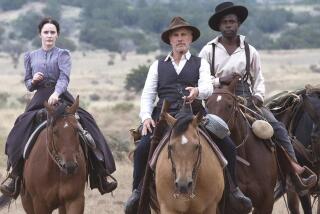Aldo Ray; Raspy-Voiced Actor Played Toughs, Soldiers in Wide Range of Films
- Share via
Aldo Ray, the bull-necked, foghorn-voiced actor who brought arrogance, brawn and a brash talent to films ranging from the significant to the mundane, died Wednesday.
Ray, who portrayed rednecks, gangsters and warriors in a wide-ranging career, was 64 and died of throat cancer at the Veterans Administration Hospital in Martinez in Northern California.
Sheila Cullen, the hospital’s associate director, said he had been admitted Feb. 19.
A former constable in the small Bay Area town of Crockett, Ray came to acting on a fluke.
He had driven his brother to an audition for football players being sought for the film “Saturday’s Hero.” Ray was at the end of what proved a successful campaign for constable. Asked if he would like to read for a part, he delivered a campaign speech instead.
When the film executives heard his raspy vocalizing, which on its best days verged on laryngitis, he was told to go home until he felt better.
“I told them that was the way I always spoke and they loved it,” he told The Times in 1981 as he was struggling to resume his career after an alcohol problem.
He appeared in “Saturday’s Hero,” a 1951 attack on America’s approach to sports, had his option renewed and was reluctantly lured by the money to abandon law enforcement for acting.
He was cast opposite Judy Holliday in “The Marrying Kind,” and the former World War II Navy frogman became an immediate success.
He went on to portray enlisted men in such combat epics as “Battle Cry,” “Men in War,” “What Did You Do in the War Daddy?” and “The Naked and the Dead,” a 1958 film in which he played Norman Mailer’s Sgt. Croft. Ten years later he was back in action in John Wayne’s “The Green Berets,” his last role in a major motion picture.
“In some ways the tough soldier role locked me in,” Ray said in an interview last November. “There were no sophisticated roles for me. I never seemed to get past master sergeant, although I always thought of myself as upper echelon.”
Born Aldo Da Re, he appeared in many nonmilitary roles in such solid productions as “Pat and Mike,” “We’re No Angels,” “The Day They Robbed the Bank of England” and “God’s Little Acre.” One of his most popular roles was as the jovial Sgt. O’Hara, who won Rita Hayworth’s heart in “Miss Sadie Thompson.”
He was invited to Great Britain to film there--a move he described as a mistake because of the caliber of parts he was offered--then returned to the United States to launch a self-described comeback.
But by that time he had experienced three failed marriages (one in 1954 to actress Jeff Donnell) and was deeply in debt. He told The Times that all he had earned for his first 10 years of film work was $100,000.
He made some investments that did not help materially, appeared (fully clothed) in a skinflick and even considered returning to politics.
Although he maintained that drinking did not affect his career, he admitted that “producers get scared by that.”
In 1983, Ray returned to Crockett, about 40 miles northeast of San Francisco, and found an occasional role in films or TV.
“I still do bits and pieces,” he said. “They like to use my name.”
But he never fulfilled the promise of his early years and admitted that he was disappointed by his career.
“I think I should have gotten a lot more good stuff,” he said.
His survivors include a daughter and two sons, one of whom, Eric Da Re, played Leo Johnson, the crazed wife-beater in the television series “Twin Peaks.”
More to Read
Only good movies
Get the Indie Focus newsletter, Mark Olsen's weekly guide to the world of cinema.
You may occasionally receive promotional content from the Los Angeles Times.










